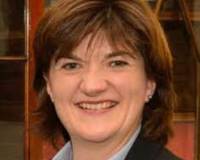'Let's talk about jihad.'
by - 20th January 2016

A BIRMINGHAM teacher on the frontline of Islamic radicalisation in Britain believes talking about it is the best way to prevent it.
Adeba Khan, who teaches at the Broadway Academy, told a meeting in Parliament she taught about jihad, and confronted pupils who held extremist beliefs.
Khan made her comments at an open meeting on combatting extremism and promoting community cohesion of the All Party Parliamentary Group on Religious Education on Tuesday this week.
Asked by Lapido Media how, as a teacher, she responded to pupils with extreme views she replied: ‘It’s our job to correct that.
‘Hiding and not talking about jihad is where the problem is.
‘We allow them to speak freely, it builds their character.’
She said that debates, discussion and argument, rather than shutting down viewpoints and opinions, were effective in stopping the radicalisation of young Britons.
However, getting pupils to talk about extremism and open up to their teacher and peers was sometimes hard.
‘The pupils often feel victimised by the media for being Muslims.’

Mr R J Skelton, the headmaster of Broadway Academy, agreed that religious education could be an ‘antidote’ to extremism.
He added that encouraging students to debate ‘really will help to combat radicalisation.’
‘Twisted ideology’
Khan’s championing of free debate comes on the same day education secretary Nicky Morgan announced new measures to combat radicalisation in schools.
Morgan announced plans for more Ofsted inspections in madrassas, a new ‘educate against hate’ website and a consultation between local authorities and schools to identify quickly any children missing from education.
However, the Education Secretary was careful to emphasise that her strategy would not limit freedom of speech.
 ‘What defines every extremist organisation throughout history is that more than anything else their mission is to close and narrow young minds – to indoctrinate, instruct and inspire hate.
‘What defines every extremist organisation throughout history is that more than anything else their mission is to close and narrow young minds – to indoctrinate, instruct and inspire hate.
‘We will not do young people any favours by wrapping them in cotton wool or subscribing to a definition of safe spaces that makes young people more fragile, and that seeks to protect young people from offence rather than from extremism.’
Extremists are not just Muslim
David Hampshire, Chairman of NASACRE (National Association of Standing Advisory Councils on Religious Education) said that discussion of extremism in education was lop-sided and loaded.
‘The narrative of religious education focuses almost entirely on Islam.’
He argued there were many different sorts of extremism - from Buddhist monks who persecute Rohingya Muslims in Myanmar to Maoist extremists in China.
When the word ‘extremism’ was used, most people linked the idea to violence.
There were other, richer and more interesting forms of ‘extremism’ that could aid pupils, he said.
‘On the whole we think that extremism is not a good thing.
‘Actually, in religious education, I want to look at some forms of extremism and I want those forms of extremism to positively challenge my pupils.
‘Let’s name, for instance, the Quakers, they’re an extremist group, they don’t hold to any particular creed, they act on conscience, they don’t go to war.’
He also cited the life of St Anthony the Great who gave up all his (considerable) worldly wealth to follow Jesus.
‘That sort of extremism is destabilising to the mind of George Osborne.
‘In a neo-liberal, market driven economy you don’t want everyone giving away all their wealth to the poor and suddenly going off into the north Yorkshire moors.’
He added that religious education was often at a remove from the everyday experiences of pupils.
‘Too much RE is about far away people in far away places.
‘It’s not focussing on what’s happening here, within these islands.’
Hampshire noted the limitation of religious education in combatting extremism saying RE could not ‘take on’ Al Qa’eda and Islamic State by itself, and that other factors were equally important
He asked whether using RE as a way to tackle extremism migt risk misunderstanding the nature of extremism.
Mistake
Revd Nigel Genders, Chief Education Officer of the Church of England, said linking religion and violent extremism was problematic.
‘Seeing religion as a driver of extreme behaviour is a mistake,’ he said.
A multitude of economic, political and personal factors could be more important.
‘Religion is not the problem.’
What was far more important in helping students understand others was religious literacy, Genders argued.
‘RE means much more than accumulating knowledge about religious faith.’
Doctor Marius Feldhof, Professor in the department of theology and religion at the University of Birmingham, agreed.
‘RE is not simply about providing information about different religions in a set time. It’s about nurturing young people.’
Genders argued that RE could ask the most important questions. ‘It asks who am I? Why am I here? How should I live?’
Religious education’s ‘primary purpose’ was to give students ‘depth of insight.’
The goal of RE, deep theological and religious literacy, allowed pupils to ‘understand others on their own terms.’
